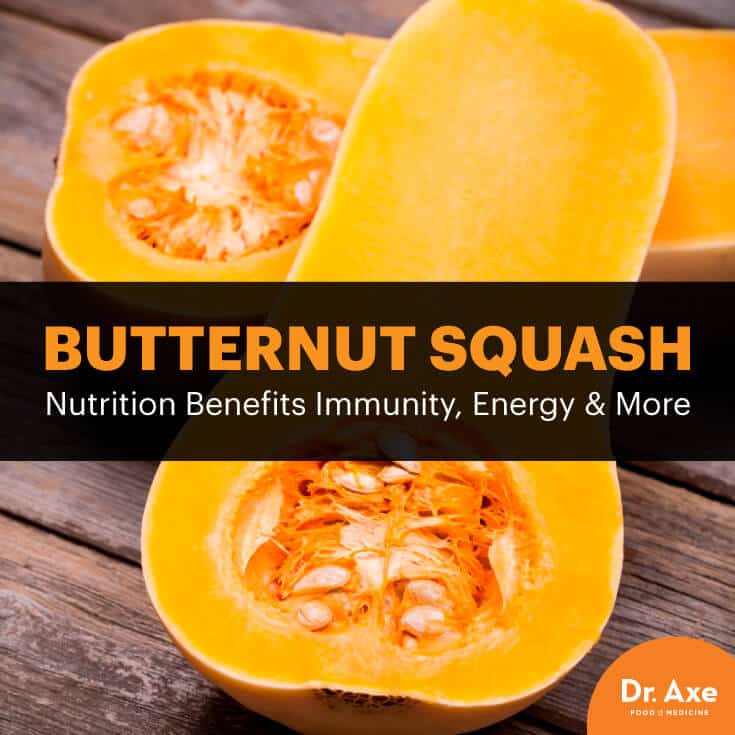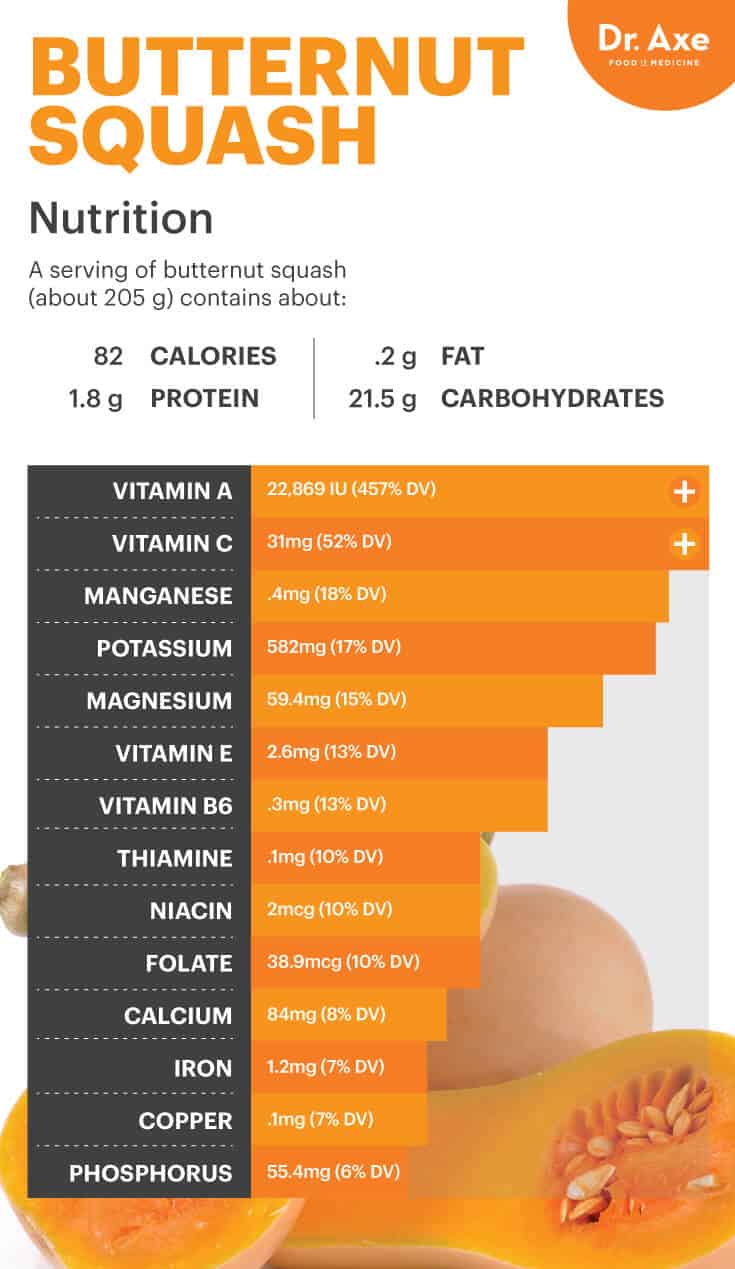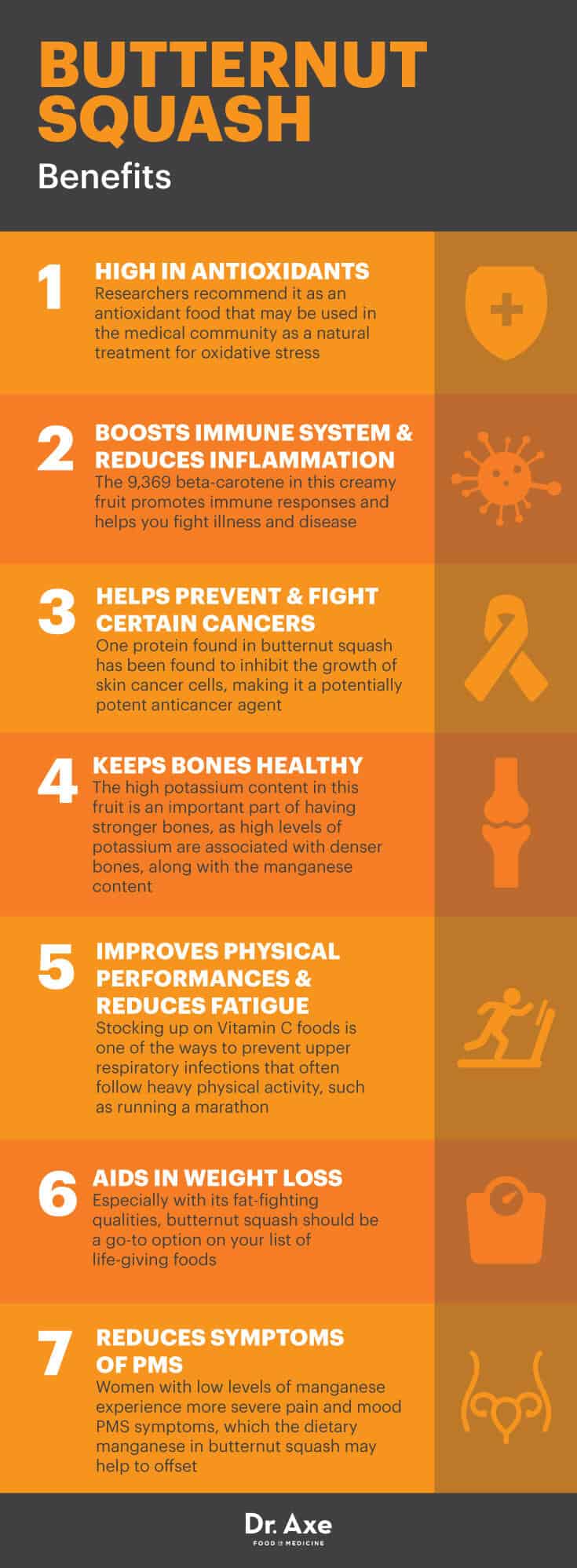Butternut Squash Nutrition Benefits Bones, Immunity, Energy & More

Why is this such a good thing? Could it be perhaps because butternut squash has enough vitamin A in just one serving to cover your entire day? Maybe it’s because butternut squash nutrition can help you lose weight, prevent cancer and even avoid catching a cold.
All of these reasons (and many more) are great reasons to incorporate butternut squash into your diet — and lest we forget, it also tastes great. So try out some of my favorite butternut squash recipes and get some of the amazing benefits of butternut squash nutrition I outline below.
Butternut Squash Nutrition Facts
Butternut squash is part of the Cucurbita family of fruits, specifically known as one of the six varieties of Cucurbita moschata. In parts of the world like New Zealand and Australia, it’s more commonly referred to as butternut pumpkin or gramma. All of the fruits in the Cucurbita family tend to be high in essential nutrients, and butternut squash is no different than its sisters, such as spaghetti squash and various gourd varieties. Although it’s botanically a fruit, it functions in food preparation more like a vegetable.The incredible nutritional value of butternut squash is difficult to overstate. With over four times the recommended daily value of vitamin A in just one serving, over half the recommended intake of vitamin C, and an impressive list of other vitamins and minerals, I highly recommend using this as a staple in your home.
One serving of butternut squash (about 205 grams) contains about: (1)
- 82 calories
- 21.5 grams carbohydrates
- 1.8 grams protein
- 0.2 gram fat
- 22,869 IU vitamin A (457 percent DV)
- 31 milligrams vitamin C (52 percent DV)
- 0.4 milligrams manganese (18 percent DV)
- 582 milligrams potassium (17 percent DV)
- 59.4 milligrams magnesium (15 percent DV)
- 2.6 milligrams vitamin E (13 percent DV)
- 0.3 milligram vitamin B6 (13 percent DV)
- 0.1 milligrams thiamine (10 percent DV)
- 2 milligrams niacin (10 percent DV)
- 38.9 micrograms folate (10 percent DV)
- 84 milligrams calcium (8 percent DV)
- 1.2 milligrams iron (7 percent DV)
- 0.1 milligram copper (7 percent DV)
- 55.4 milligrams phosphorus (6 percent DV)
Benefits of Butternut Squash Nutrition
1. High in AntioxidantsAlthough butternut squash has been around just over half a century, one of the most well-known benefits of butternut squash nutrition is its high antioxidant load. Researchers even recommend it as a high-antioxidant food that may be used in the medical community as a natural treatment for oxidative stress. (2)
You’ve probably heard the word “antioxidant” a lot in terms of various healthy foods, but why exactly are these qualities so important to your overall health? Antioxidants are free radical scavengers. Free radicals are compounds that are created by various bodily functions. They may also enter the body through various means, including exposure to certain chemicals, the sun or processed food products.
In the body of someone eating a balanced, healthy diet, free radicals perform their normal functions, and any negative impact they may have is overwhelmed by antioxidants. However, if your diet is full of empty calories and dangerous chemicals, you often spend too much time in the sun, and/or you expose your body to chemicals through cosmetics and other endocrine disruptors, the free radicals in your body may cause oxidative stress. Damage by oxidative stress is linked to a large number of diseases and strongly associated with cancer. (3)
The moral of this story? Fill your diet with antioxidants, like the ones in butternut squash.
Antioxidants fall into various categories, and some found in butternut squash include three different carotenoids. (4) These nutrients are fat-soluble antioxidants, meaning that they’re most efficiently absorbed into the body when accompanied by fat sources, such as avocado or olive oil. Butternut squash contains a massive amount of vitamin A, the source of the incredible antioxidants beta-carotene, alpha-carotene and beta-cryptoxanthin, which are linked to a reduction in inflammation and prevention of specific cancers.
One reason it’s important to get the recommended amount of vitamin A (and more) from your food, rather than supplements, is that vitamin A can be toxic when consumed in supplements in too high a quantity. However, dietary vitamin A isn’t toxic, because your body absorbs and uses only what it needs.
Another beneficial antioxidant-related nutrient in butternut squash is manganese, which aids in the enzyme reactions of various antioxidants. Animals deficient in manganese show a low function of superoxide dismutase, which is one of the most powerful antioxidants in the human body, sometimes referred to as the “primary” or “master” antioxidant.
2. Boosts Immune System and Reduces Inflammation
Aren’t you glad butternut squash contains so much beta-carotene? You should be. The beta-carotene in this creamy fruit promotes immune responses and helps you fight illness and disease. (5)
Vitamin A is also responsible for the immune-boosting power of butternut squash nutrition. While it has the ability to fight scary diseases like cancer and autoimmune disorders, it can also help prevent the common cold and other infections. Part of how it protects against such a large number of infections and diseases is because vitamin A reduces inflammation, which is at the root of most diseases. In fact, inflammation is generally caused by an overactive immune system that attacks more than it should. Keep your immune system in balance, and reduce inflammation by eating foods high in vitamin A.
The vital nutrients don’t stop there. Butternut squash also contains high amounts of vitamin C, another common immune system booster that not only helps prevent and treat colds, but also lessens or inhibits the development of more serious conditions from common infections, such as pneumonia and lung infections.
3. Helps Prevent and Fight Certain Cancers
Most superfoods are also cancer-fighting foods or have cancer prevention qualities, and butternut squash is no exception. That’s because the best way to reduce your risk of cancer is to fuel your body with nutrients that keep it healthy and able to fight infection and disease.
One protein found in butternut squash has been found to inhibit the growth of melanoma (skin cancer) cells, making it a potentially potent anticancer agent. (6) Additionally, the vitamin C content found in butternut squash nutrition may be useful in treating lung and ovarian cancers, as well as helping chemotherapy drugs target cancer cells more effectively without damaging other cells as much.

4. Keeps Bones Healthy
Butternut squash can also help you maintain strong, healthy bones. The high potassium content in this fruit is an important part of having stronger bones, as high levels of potassium are associated with denser bones, even in postmenopausal women and older men, both of whom often have more brittle bones and are at a higher risk of osteoporosis.
The manganese in butternut squash is also beneficial for bone health and prevention of osteoporosis, especially in women who have undergone menopause.
5. Improves Physical Performance and Reduces Fatigue
Do you experience regular fatigue? Would you like to operate at peak physical performance? If your answer to either of these is “yes,” butternut squash nutrition may be a partial answer to your desires.
Researchers in Taiwan found that Cucurbita moschata was effective in a mice model in decreasing fatigue and increasing the exercise performance of the mice in the study. (7)
Vitamin C is also helpful in physical performance, as it increases the oxygen your body absorbs from the air you breathe when eaten/taken in conjunction with physical exertion. Stocking up on vitamin C foods is one of the ways to prevent upper respiratory infections that often follow heavy physical activity, such as running a marathon.
6. Aids in Weight Loss
To reach and/or maintain a healthy weight, your diet should be full of foods that are stocked with nutrients without overwhelming your body with calories — like butternut squash. One serving contains just 82 calories, making it a welcome addition to many meals that won’t make you feel guilty later.
However, the low calories in butternut squash are only the beginning. One 2012 study, following up on initial research, found that an extract from Cucurbita moschata has very effective anti-obesity qualities. It impacts a variety of cellular processes, including the formation of fat known as lipogenesis. Essentially, this extract stops the body from producing new fat to store. (8)
There is also a small body of preliminary research that suggests manganese intake can help reduce the weight of obese or overweight individuals, especially when consumed along with potassium (also found in butternut squash) and other supportive nutrients.
Scheduling a menu and consuming good foods in place of processed, unhealthy ones are two of the ways you can lose weight fast (and naturally). Especially with its fat-fighting qualities, butternut squash should be a go-to option on your list of life-giving foods.
7. Reduces Symptoms of PMS
Did you know that most of the foods women typically consume during and before their periods actually make PMS symptoms worse? This is especially true for things that contain sugar, alcohol and caffeine.
However, there are some great options that you can add to your diet to reduce symptoms of PMS without drugs like Midol, which may effectively relieve symptoms but also contain the possibility of dangerous and severe side effects in some people. One such natural PMS treatment is butternut squash.
For example, women with low levels of manganese experience more severe pain and mood PMS symptoms, which the dietary manganese in butternut squash may help offset. (9) The potassium in butternut squash nutrition also helps prevent and alleviate muscle cramps (not limited only to PMS).
Other PMS-fighting nutrients found in butternut squash include vitamins K and E.
Butternut Squash Nutrition History and Interesting Facts
Although it’s now a well-known fruit, butternut squash has only been around since the 1940s. The earliest documented butternut squash originated in Waltham, Mass., and was purportedly developed by Charles A. Leggett, an insurance agent who “fell into” farming when his doctor insisted he spend more time outdoors. According to his wife, Dorothy, Leggett began farming corn but found it difficult and less financially substantial in the already saturated market. Eventually, he began farming squash.Charles found the gooseneck squash and Hubbard squash to combine to make a more conveniently shaped and sized squash. When asked what he wanted to call it, Leggett said it was “smooth as butter and sweet as a nut,” leading to its new title as the butternut squash.
How to Select, Prepare and Cook Butternut Squash
Typically, butternut squash is available fresh in the U.S. during September and October, but it’s available year-round most of the time as an imported fruit. When selecting, look for a solid beige color skin without bruising or damage marks. Brown spots or large nicks along the surface may allow bacteria to enter the squash, so avoid options that look damaged in some way. You can keep it in your kitchen outside of the refrigerator, but be sure to place it in an area without direct sunlight, as sunlight speeds up the process of degradation.Butternut squash is most often roasted, but you can prepare it in a variety of ways. Generally, it’s cut into cubes before cooking. Preparing the squash in this way isn’t very difficult but does involve a few steps. First, cut the top and bottom from the squash, then cut the thinner “neck” from the fatter bulb area. Use a sharp peeler or paring knife to remove the thick skin. Out of the bulb, you want to remove the seeds (which can also be roasted, much like pumpkin seeds), then slice the squash into cubes, usually about an inch to an inch and a half in length.
Interested in some unique ways to cook your squash? Roasting isn’t the only option. Some recipes call for squash to be steam-baked, boiled, microwaved or baked. The taste of squash is sweet and buttery, somewhat similar to pumpkin.

Potential Side Effects and Caution with Butternut Squash
As with any food product, butternut squash is known to occasionally cause an allergic reaction. The reactions are generally minimal and limited to contact dermatitis or mild swelling around the hands or mouth.One common reaction (although not an allergic one) that people experience when peeling raw butternut squash is a drying and peeling of the skin of the hands. This is not actually dermatitis or any other allergy, but rather the squash’s natural defense mechanism at work. Before it ripens, the internal sap of the butternut squash repairs external damage done to it, such as a bite from an animal or other physical puncture.
If you peel butternut squash before it’s fully ripe and experience this, you need to thoroughly wash your hands and use an extra-strength moisturizing lotion. Most likely, a thin layer of skin will peel from the affected portions of your hands, leaving pink, fresh skin behind. To avoid drying your hands out, you should only prepare fully ripened squash. If you aren’t sure if your butternut squash has ripened fully, consider wearing a pair of gloves while peeling and prepping your squash for cooking.
Final Thoughts on Butternut Squash Nutrition
- Butternut squash is part of the Cucurbita family, which also includes spaghetti squash and different types of gourds.
- Butternut squash nutrition includes many vitamins and minerals that are vital to maintaining premium health, and it only contains 82 calories per serving.
- The massive load of antioxidants, anticancer and anti-inflammatory nutrients in butternut squash make it effective in preventing and treating a large variety of health conditions, from the common cold to potentially certain cancers.
- There are fat-fighting qualities of butternut squash that make it great for weight loss efforts.
- Along with other natural methods, butternut squash can help reduce PMS symptoms.
- There are many ways to prepare and cook butternut squash, although it’s generally cubed and roasted.
- It’s important to make sure your squash is fully ripened before peeling. If you’re not certain, consider wearing gloves to avoid the internal sap of the squash from drying out your hands.
No comments:
Post a Comment